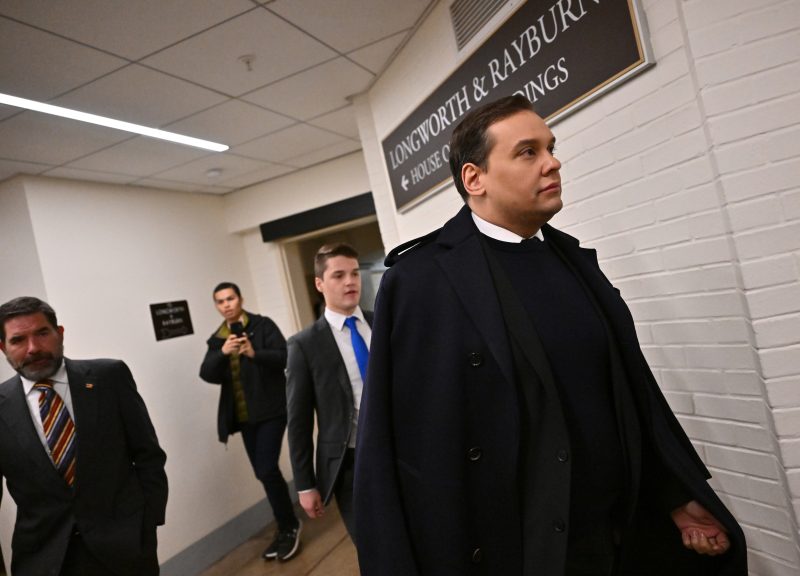The House on Friday voted to expel Rep. George Santos (R-N.Y.) from Congress — an action the chamber had taken only five times in U.S. history — in response to an array of alleged crimes and ethical lapses that came to light after the freshman lawmaker was found to have fabricated key parts of his biography. With a little more than a year left in the congressional term, what happens to the vacancy for the seat representing New York’s 3rd Congressional District? Here’s what to know:
Under New York law, the vacancy of Santos’s seat requires New York Gov. Kathy Hochul (D) to call for a special election within 10 days of the vacancy. After the House voted to expel Santos on Friday, Hochul said in a social media post that she will announce the date for the special election within the 10 days state law requires.
“I take this responsibility seriously, and am committed to ensuring there will be a Member of Congress who can serve Nassau and Queens Counties,” Hochul said.
As required by law, I will announce the date for a special election in the third district within the next ten days.
I take this responsibility seriously, and am committed to ensuring there will be a Member of Congress who can serve Nassau and Queens Counties.
— Governor Kathy Hochul (@GovKathyHochul) December 1, 2023
State law requires the special election between 70 and 80 days after the governor’s call for one. So with Hochul’s expected announcement to come by Dec. 11, the special election is likely to take place in mid- to late February.
The Democratic and Republican parties’ leadership in Queens and Nassau counties, where the 3rd district is, will select the candidates to run in the special election. New York law does not require a formal primary to produce candidates to fill a vacant House seat.
With Republicans holding a narrow majority, the special election in a district President Biden won in 2020 by nearly 10 percentage points is expected to be competitive and expensive. It also could serve as a barometer for elections in swing districts the following year.
Though no one has officially declared a candidacy for the special election, several people have already announced that they intend to run for the seat in 2024. Former House member Thomas Suozzi, a Long Island Democrat who gave up his seat representing the 3rd district after three terms to run for governor, is among them. Other Democratic contenders include Democratic fundraiser Zak Malamed, former N.Y. state senator Anna Kaplan, and Josh Lafazan, a member of the Nassau County legislature.
The Republicans eyeing the seat in 2024 include investment banker and Afghanistan war veteran Kellen Curry, former New York Police Department detective Mike Sapraicone, and former Israel Defense Forces member Daniel Norber.
The vote to expel the former lawmaker came two weeks after the release of a 56-page Ethics Committee report that accused Santos of an array of misconduct — including stealing money from his campaign, deceiving donors about how contributions would be used, creating fictitious loans, and engaging in fraudulent business dealings. Santos, the report alleges, spent hefty sums on personal enrichment, including visits to spas and casinos, shopping trips to high-end stores and payments to a subscription site that contains adult content.
The resolution, which passed in a 311-114 vote Friday, was the third effort to oust the freshman lawmaker.
Santos also faces nearly two dozen federal criminal counts, including allegations of defrauding his donors, using their money for his personal benefit, stealing the identities of family members and using donors’ credit cards to spend thousands of dollars. He has pleaded not guilty to all charges.
The House Ethics Committee said its investigators found “substantial evidence” that Santos knowingly violated ethics guidelines, House rules and criminal laws.
Investigators reviewed more than 170,000 pages of documents and testimony from dozens of witnesses, including financial statements, to reach their conclusions.
“Representative Santos sought to fraudulently exploit every aspect of his House candidacy for his own personal financial profit. He blatantly stole from his campaign. He deceived donors into providing what they thought were contributions to his campaign but were in fact payments for his personal benefit,” the report stated.
It continued: “He reported fictitious loans to his political committees to induce donors and party committees to make further contributions to his campaign — and then diverted more campaign money to himself as purported ‘repayments’ of those fictitious loans. He used his connections to high value donors and other political campaigns to obtain additional funds for himself through fraudulent or otherwise questionable business dealings. And he sustained all of this through a constant series of lies to his constituents, donors, and staff about his background and experience.”
One hundred and five Republicans and 206 Democrats voted to expel Santos. Here’s a look at how each House member voted.

